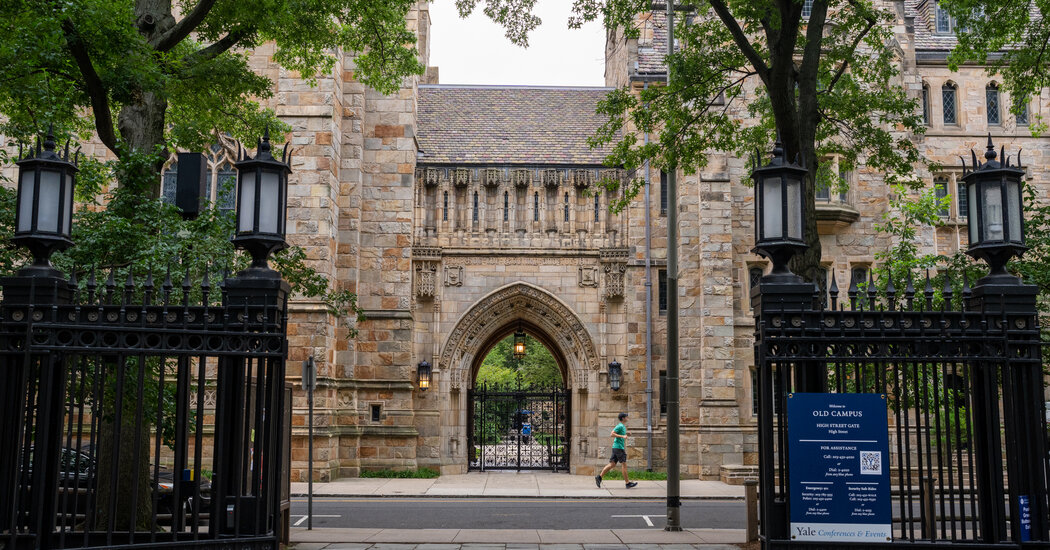
 News
News 
Yale University will require standardized test scores for admission for students applying to enter in the fall of 2025, becoming the second Ivy League university to abandon test-optional policies that had been widely embraced during the Covid pandemic.
Yale officials said in an announcement on Thursday that the shift to test-optional policies might have unwittingly harmed students from lower-income families whose test scores could have helped their chances.
While it will require standardized tests, Yale said its policy would be “test flexible,” permitting students to submit scores from subject-based Advanced Placement or International Baccalaureate tests in lieu of SAT or ACT scores.
Yale’s decision, which will not affect students who applied during the current admissions cycle, followed a similar decision in February from Dartmouth College. Dartmouth, in Hanover, N.H., said an analysis had found that hundreds of students from lower socioeconomic backgrounds who had solid scores — in the 1,400 range on the SAT — had declined to submit them, fearing that they fell too far below the perfect 1,600. In 2022, the Massachusetts Institute of Technology announced that it had reinstated its testing requirement.
These institutions remain in the minority. Many decided to keep their test optional policies in place as the pandemic waned.
The number of students taking the SAT dropped to 1.7 million in 2022, a decline from 2.2 million in 2020.
More than 80 percent of four-year colleges — or at least 1,825 of the nation’s bachelor-degree-granting institutions — will not require SAT or ACT scores this fall, according to the organization Fair Test, which has fought against standardized testing.
The anti-testing movement has long said that standardized tests help fuel inequality, because many students from affluent families use tutors and coaches to bolster their scores.
After the Supreme Court’s decision last year banning race-conscious admissions, many experts predicted that test-optional policies would become even more widespread.
But some recent research has questioned whether test-optional policies may actually hurt the very students they were meant to help.
In January, Opportunity Insights, a group of economists based at Harvard, published a study that found that test scores could help identify lower-income students and students from underrepresented populations who would thrive in college. High scores from less-privileged students can signal high potential.
Yale, in New Haven, Conn., said that test scores were particularly valuable in evaluating students who attend high schools with fewer academic resources or college preparatory courses.
Jeremiah Quinlan, the dean of undergraduate admissions at Yale, said in a written statement released by the university that Yale had determined that test scores, while imperfect, were predictive of academic success in college.
“Simply put,” he said, “students with higher scores have been more likely to have higher Yale G.P.A.s, and test scores are the single greatest predictor of a student’s performance in Yale courses in every model we have constructed.”
When students do not submit test scores, the admissions committee focuses on other elements of the student’s file, Mr. Quinlan said.
“For students attending well-resourced high schools, substitutes for standardized tests are relatively easy to find: transcripts brim with advanced courses, teachers are accustomed to praising students’ unique classroom contributions, and activities lists are full of enrichment opportunities,” he said in the statement. “Increased emphasis on these elements, we found, has the effect of advantaging the advantaged.”
Yale said recently that it had received over 57,000 applications for admission this fall, a record number driven, in part, by the university’s test-optional policy. Admissions rates at Yale are about 4 percent.
Mr. Quinlan said that Yale had recently admitted 1,000 students who did not submit test scores and that they had done relatively well in their Yale courses.
24World Media does not take any responsibility of the information you see on this page. The content this page contains is from independent third-party content provider. If you have any concerns regarding the content, please free to write us here: contact@24worldmedia.com